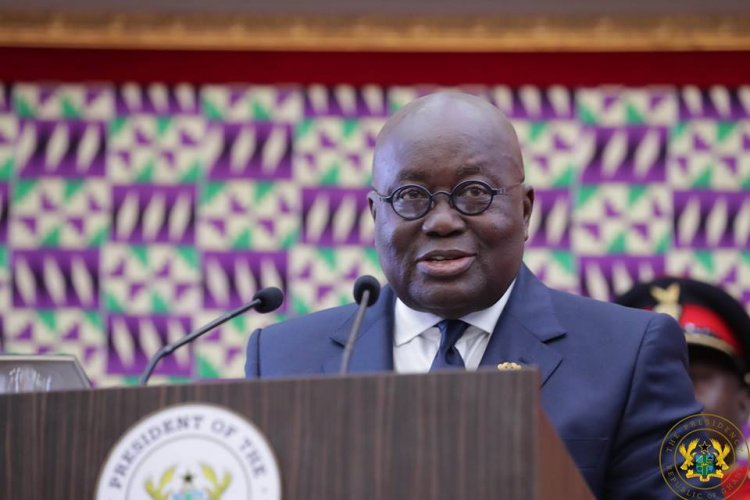Covid-19 Has Caused Considerable Job Losses - Akufo Addo
President of the Republic of Ghana Akufo-Addo has stated in his first State of the Nation address in his second term that pandemic covid-19 has caused many job losses in the country

President of the Republic of Ghana Akufo-Addo has stated that pandemic covid-19 has caused many job losses in the country.
He said according to the COVID-19 Business Tracker survey, the COVID-19 pandemic has led to a considerable number of job losses, with many Ghanaian businesses and firms being forced to cut costs by reducing staff hours, cutting wages, and, in some cases, laying off workers.
President Akufo-Addo made the claim in delivering his first message on the State of the Nation in his second term as president.
He said, between 2017 and the first quarter of 2020, we had made considerable gains in the management of the national economy, where we witnessed an annual average growth of seven percent (7%), single-digit inflation, reduced fiscal deficits with three consecutive years of primary surpluses, a relatively stable exchange rate, a significant improvement in the current account with three consecutive years of trade surpluses, strong foreign exchange reserve buffers, markedly reduced lending rates, and significant job creation.
According to the President Akufo-Addo, COVID-19 Business Tracker, again, showed that about seven hundred and seventy thousand (770,000) workers had their wages reduced, and about forty-two thousand (42,000) employees were laid off during the three-week partial lockdown imposed on the Greater Accra and Greater Kumasi Metropolitan Areas and their contiguous districts, Tema and Kasoa. The government, however, succeeded in protecting the jobs and incomes of all public sector workers.
Mr. President indicated that, Indeed, the cost of COVID-19 has been enormous. Our overall economic growth rate for 2020 was revised downwards from 6.8% to 0.9%. The non-oil economy was also revised from 6.7% to 16%. The revenue shortfall was estimated at GH¢13.5 billion, with additional expenditures related to stemming the tide of COVID-19 estimated at GH¢11.8 billion, with the combined effect amounting to GH¢25.3 billion, or 6.6% of GDP.
Akufo Addo told members of parliament and all invited guests that, at the time that we know what to do to bring the economy to life, what we do not know how to do is to bring people back to life. That is Government did not hesitate to institute measures to protect the lives and livelihoods of
Ghanaians, even if it was to the temporary detriment of our much sought-after fiscal stability.
The resultant fiscal deficit for 2020 was, thus, revised from 4.7% of GDP to 11.4% of GDP. This was done to reflect the impact of the pandemic. The fiscal responsibility rule of keeping a deficit within a threshold of 5% of GDP and positive primary balance for every year was suspended to enable fiscal operations to accommodate the impact of the pandemic.
Support has also been forthcoming from the Bank of Ghana, which has lowered the Monetary Policy Rate by one hundred and fifty (ISO) basis points to 14.5 percent, reduced the Primary Reserve Requirement from ten percent (10%) to eight percent (8%), reduced the Capital Adequacy Requirement from thirteen percent (13%) to eleven-point five percent (11.5%), and reduced interest rates based on the Ghana Reference Rate by two hundred (200) basis points.
Examples Measures put in place by the Government to cushion Ghanaians from the impact of COVID-19: the formulation and implementation of the COVID-19 preparedness and response plan; tracing, testing, treatment; waiver of personal income tax and provision of an additional fifty percent (50%) basic salary allowance to healthcare workers; expanding the capacities of laboratories to increase COVID-19 testing; establishment of isolation centers in all regions and districts; fumigation of markets and schools;
Also, provision of food packages and hot meals for residents in areas affected by the partial lockdown provision of free water for all households, provision of free electricity for lifeline consumers and a fifty percent (50%) discount for all other consumers; reduction in the Communication Service Tax (CST) from nine percent (9%) to five percent (5%), the institution of a seven hundred and fifty million cedis (GH¢7S0 million) loan facility for micro, small and medium enterprises through the CAPBUS Initiative; and the provision of a two billion cedi (GH¢2 billion) guarantee facility to support large businesses, such as schools and pharmaceutical companies.
Kwaku Ansah, Parliament


 Joseph Marfo
Joseph Marfo 


































